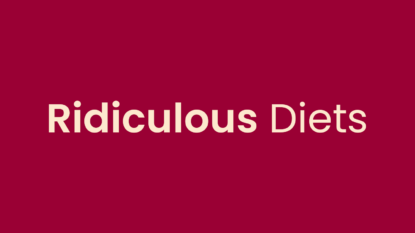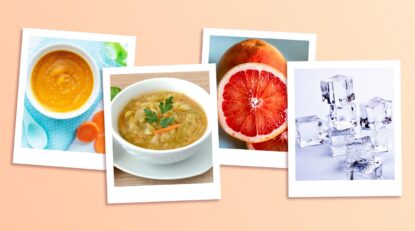18 Ridiculous Diet Trends from the Last 20 Years (That You Should Avoid!)
The world of weight loss has seen some truly bizarre fad diets, and certainly over the last two decades. While some of these trends were merely impractical, others were outright dangerous. Here’s a rundown of some of the most ridiculous, extreme, and plain silly diets people have tried — plus a sustainable approach that works.
- The Baby Food Diet (2000s)
- Once popular among celebrities, this diet replaced your daily meals with jars of baby food.
- While obviously portion-controlled, it wasn’t nutritionally complete, lacked essential nutrients for adults, and encouraged disordered eating.
- The Cotton Ball Diet (2010s)
- Involved swallowing juice-soaked cotton balls to feel full.
- Caused dangerous digestive blockages and choking risks.
- The Tapeworm Diet (2000s-Present)
- People swallowed tapeworms to consume food inside their bodies.
- Extremely dangerous due to severe malnutrition risks and other medical complications
- The Werewolf Diet (2010s)
- Fasting during full moons, believing the lunar cycle impacts weight loss.
- No scientific basis—just a mix of astrology and starvation.
- The Breatharian Diet (2000s-Present)
- Followers claimed to survive on air and sunlight alone.
- Extremely dangerous, leading to starvation, hospitalisation and eventual death.
- The Sleeping Beauty Diet (2000s)
- Promoted excessive sleeping (sometimes with sedatives) to avoid eating.
- Encouraged relying on sedatives and sleeping pills, leading to serious health risks.
- The Ice Diet (2010s)
- People ate large amounts of ice, believing it burned calories.
- A short lived diet which resulted in feeling cold, miserable, and very hungry.
- The Drinking Man’s Diet (2000s)
- Allowed whisky, gin, and brandy but restricted carbs.
- While low-carb diets can work, alcohol is a metabolic toxin and best avoided outside advised upper limits.
- Nutrient deficiencies and probably very severe hangovers too.
- The Baby Bottle Diet (2010s)
- Encouraged drinking all meals through a baby bottle to slow eating.
- Looked ridiculous, didn’t promote long-term healthy habits and encouraged disordered eating.
- The Cabbage Soup Diet (2000s-2010s)
- Eating only cabbage soup for a week promised quick weight loss.
- Led to excessive lean tissue loss, dizziness, and excessive wind not to mention spelling pretty awful on a day to day basis.
- The Vinegar Diet (2000s-Present)
- Drinking apple cider vinegar before meals to “boost metabolism.”
- Can cause acid reflux, enamel erosion, and digestive discomfort.
- The Vision Diet (2010s)
- Suggested wearing blue-tinted glasses to make food look unappealing.
- Eating less because your food looks unappealing hasn’t been shown to work
- The Airplane Food Diet (2010s)
- Inspired by portion-controlled airline meals.
- While portion control is effective, microwave meals in plastic trays aren’t a satisfying, nutritious, nor balanced approach.
- The Cotton Candy Diet (2010s)
- People replaced meals with small amounts of cotton candy for quick sugar absorption.
- No protein, fibre, essential fat, or other nutrients—just a straight sugar rush and inevitable crash. Completely unsustainable and very damaging to dental health.
- The Raw Meat Diet (2020s)
- A growing trend of eating only raw meat, eggs, and dairy.
- High risk of food poisoning, nutrient imbalances, and bacterial infections not to mention the exorbitant cost and the yuck factor.
- The Potato Diet (2010s)
- Eating only plain potatoes for days or weeks.
- Low in protein and many other nutrients, leaving people unsatisfied, hungry and undernourished.
- The Grapefruit Diet (2000s)
- Claimed grapefruit burns fat when eaten before meals.
- No scientific proof—just an excuse to eat fewer calories.
- The Chewing Diet (2000s)
- Encouraged chewing food up to 100 times before swallowing.
- Time-consuming, impractical, and led to more jaw pain than weight loss.
What Actually Works? The Science Behind VLCDs
While fad diets come and go, scientifically backed approaches to weight loss focus on nutritional balance, behaviour change, sustainability, and wrap-around support. One such approach is a Total Fast, a Very Low-Calorie Diet (VLCD), which has been clinically proven to help with weight loss and metabolic health.
Unlike extreme fads, LighterLife’s VLCD offers: ✔ Nutritionally complete meal replacements.
✔ Expert guidance and group support
✔ A structured plan for long-term success
If you’re tired of diet gimmicks and want a proven approach, learn more about how LighterLife can help you achieve lasting results.



